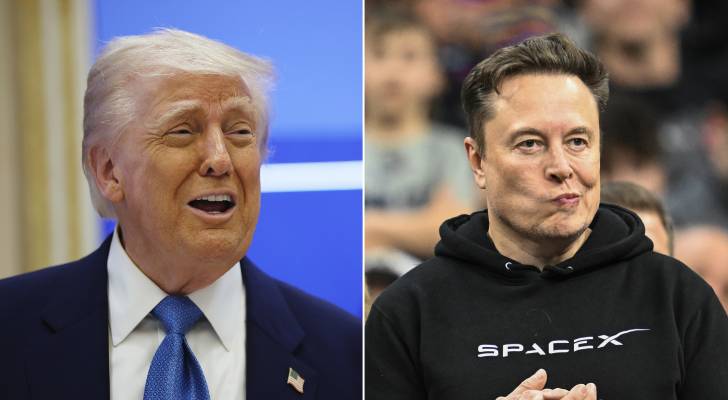
Back in February, James Fishback, founder and CEO of investment firm Azoria, proposed the idea of a “DOGE dividend” on social media. It was an idea that caught the attention of Elon Musk.
“American taxpayers deserve a ‘DOGE Dividend’: 20% the money that DOGE saves should be sent back to hard-working Americans as a tax refund check,” Fishback posted on X. “It was their money in the first place!”
He went on to say that — with $2 trillion in savings from the Department of Government Efficiency (DOGE) and 79 million tax-paying households — this payment would work out to about $5,000 per household, “with the remaining used to pay down the national debt.”
Don’t miss
- I’m 49 years old and have nothing saved for retirement — what should I do? Don’t panic. Here are 5 of the easiest ways you can catch up (and fast)
- Gain potential quarterly income through this $1B private real estate fund — even if you’re not a millionaire. Here’s how to get started with as little as $10
- You’re probably already overpaying for this 1 ‘must-have’ expense — and thanks to Trump’s tariffs, your monthly bill could soar even higher. Here’s how 2 minutes can protect your wallet right now
DOGE chief Musk — who has since said he’s stepping back from his role — responded by saying he’d share the idea with President Donald Trump. The president then promoted the idea onstage at a summit on Feb. 19.
So, can you expect a DOGE dividend check any time soon?
Who would be eligible?
Fishback’s proposal assumed that DOGE would achieve $2 trillion in cuts — but that doesn’t appear likely. Indeed, DOGE has revised its savings goal a few times from $2 trillion to $1 trillion and now to $150 billion.
If, however, DOGE was able to achieve $2 trillion in cuts, Fishback says 20% — or $400 billion — could then be divided among 79 million taxpaying households. That works out to $5,000 per household.
But his DOGE dividend would only go to households above a certain income threshold (those who don’t get a tax refund). In other words, lower-income Americans may not qualify.
Many Americans who have an adjusted gross income of under $40,000 owe little or no federal income tax, “especially after factoring in the effects of refundable tax credits, such as the child and earned-income credits,” according to the Pew Research Center.
Fishback says this makes the DOGE dividend different from the stimulus checks sent out as part of the 2021 American Rescue Plan during the COVID-19 pandemic — in which he says checks were sent out “indiscriminately,” according to NBC News.
Read more: Want an extra $1,300,000 when you retire? Dave Ramsey says this 7-step plan ‘works every single time’ to kill debt, get rich in America — and that ‘anyone’ can do it
It’s worth noting that a dividend isn’t the same thing as a subsidy. A dividend is a distribution of profits by a corporation to its shareholders, while a stimulus check is a payment made by a government to its citizens in order to stimulate spending and boost consumer confidence during times of economic hardship.
Coming up short
As of May 12, the DOGE website indicates that it’s saved $170 billion through a “combination of asset sales, contract/lease cancellations and renegotiations, fraud and improper payment deletion, grant cancellations, interest savings, programmatic changes, regulatory savings and workforce reductions.” The amount saved per taxpayer is $1,055.90.
While this falls far short of the $2 trillion goal, several news organizations have also reported that DOGE has overstated some of those savings and published errors and misleading information.
At the same time, DOGE could actually cost taxpayers $135 billion this fiscal year, according to an estimate from the Partnership for Public Service, a nonpartisan research and advocacy group for the federal workforce. This includes the costs associated with re-hiring mistakenly fired workers, lost productivity and paid leave for thousands of federal workers.
“The $135 billion cost to taxpayers doesn’t include the expense of defending multiple lawsuits challenging DOGE’s actions, nor the impact of estimated lost tax collections due to staff cuts at the IRS,” reports CBS News.
Either way, not much has happened lately to carry the idea forward. A formal proposal has yet to be made in Congress. Even if Americans were to get a check, at this point, it seems unlikely to amount to much. Since DOGE has revised its savings from $2 trillion to $150 billion, 20% (or $30 billion) would mean a one-time DOGE dividend of around $380.
At the same time, as of May 12, tariffs are expected to cost American households around $1,200 in 2025, according to estimates by the nonpartisan Tax Foundation. And that includes low-income households who wouldn’t be eligible for Fishback’s proposed DOGE dividend check in the first place.
What to read next
- Millions of Americans now sit on a stunning $35 trillion in home equity — here’s 1 new way to invest in responsible US homeowners while targeting a 14%-17% IRR
- Robert Kiyosaki warns of a ‘Greater Depression’ coming to the US — with millions of Americans going poor. But he says these 2 ‘easy-money’ assets will bring in ‘great wealth’. How to get in now
- Here are 5 ‘must have’ items that Americans (almost) always overpay for — and very quickly regret. How many are hurting you?
This article provides information only and should not be construed as advice. It is provided without warranty of any kind.